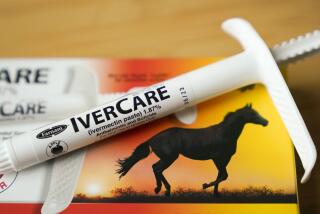FDA: Vitamin Claims Need to Be Proven
- Share via
WASHINGTON — In a controversial decision, the Food and Drug Administration announced Monday that manufacturers must have scientific proof of the benefits of dietary supplements--vitamins, minerals, amino acids and other nutritional substances--before they can make health claims on product labels.
The decision holds the dietary supplement industry to the same standards that the agency set for health claims about food.
The new rules, which are now subject to 60 days of public comment, mean that scientific experts must agree about the value of a supplement before the manufacturer may place the information on a label.
The rules also would require labels for dietary supplements to carry the same kinds of nutritional information as processed foods, including the amount of nutrients in a serving and the percentage of daily requirements a serving provides.
“FDA’s goal is simple: We want people to have access to products that are safe and we want to assure consumers that claims made about the health and nutritional benefits are truthful,” FDA Commissioner David A. Kessler said in a statement. “We recognize that the body of knowledge about the benefits and risks of many of these products is growing and changing every day. We will take advantage of that knowledge, but hype cannot overwhelm science.”
The action was praised by consumer groups, who have sought truth in advertising on the benefits of supplements, but it was criticized by the $4-billion-a-year supplement industry, which contends that it will rob consumers of valuable information about a product.
Bruce Silverglade, of the Center for Science in the Public Interest, called the FDA action “encouraging” and said that consumers would be protected from “poorly substantiated claims,” while benefiting from legitimate ones.
“There is simply no justification for setting a lower standard of truthfulness for supplement claims,” he said.
But J. B. Cordaro, president of the Council for Responsible Nutrition, an industry group, argued that the regulations “are choking off the flow of information to the public.”
“If the evidence suggested that an increased consumption of antioxidants was helpful in preventing certain types of cancer, we should be able to provide the state of evidence with caveats,” he said. “People should know the state of the evidence--and be allowed to make their own decisions.”
A growing body of research continues to indicate that some vitamins--particularly the antioxidants vitamins C, E, and beta carotene, a form of Vitamin A--can play a role in preventing heart disease, certain kinds of cancer and other conditions. But most of the studies remain inconclusive.
The new regulations are required by the Nutrition Labeling and Education Act, which was enacted by Congress in 1990 to overhaul the nation’s food labels. Efforts already are under way on Capitol Hill, however, to write legislation to weaken the dietary supplement standards.
The FDA also said that it intends to work with food and supplement manufacturers and the scientific community on additional health claims--beyond those permitted by the newly announced regulations--that should be permitted on labels.
The agency plans in July, for example, to authorize manufacturers to claim that folic acid benefits women of child-bearing age by preventing defects in the neural tube--which develops into the brain and spinal cord--in their children.
Next, the FDA will look more closely at the kinds of claims that may be made about the antioxidant vitamins and their role in preventing cancer and other diseases, the agency said.
Silverglade said that his group is pleased that the FDA is prepared to propose health claims for folic acid and birth defects, and urged the agency to move quickly to allow claims about the benefits of antioxidants, “should clinical trials now under way confirm that high levels of those antioxidants can reduce the risk of heart disease or cancer.”
The FDA said it also would take special action regarding amino acid dietary supplements because of “special concern” generated by the use of L-tryptophan. Products containing this amino acid were associated with 38 deaths and 1,500 cases of a painful muscle disorder several years ago.
The agency said that it would require manufacturers of amino acid supplements to submit information proving the safety of their products.
In 1990, the FDA convened a special scientific study by the Federation of American Societies for Experimental Biology on the safety of amino acids. The panel analyzed data on the 22 amino acids most commonly used as supplements and concluded that the scientific information was fragmentary and that no definitive judgment could be made about their safety.
Times staff writer Howard Libit contributed to this story.






